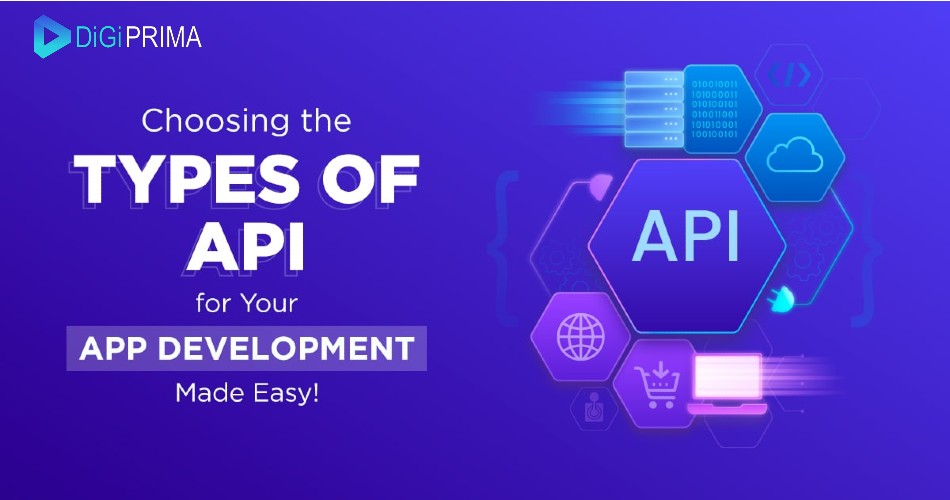
Connect with Digiprima Technologies at InnoEx 2024 (HKTDC) – Hong Kong
Published 2023-06-13

Businesses increasingly rely on APIs to interact with customers and partners. That's why it's important to know which type of API is right for your needs.
API stands for Application Programming Interface. It is a powerful and versatile tool for connecting multiple APIs and different software applications. Application Programming Interface, an acronym for Application Programming Interface, is a set of definitions and protocols that allow technology products and services to communicate with each other via the Internet of Things (IoT).
Application Programming Interface (API) is a software interface that allows two applications to interact with each other without any user intervention.
Application programming interfaces (API) drive much of the content consumed on the web, and they also drive much of the communication between software and services in the technology-driven world.
The survey reports that 68.5% of developers expect to rely more on APIs in 2023, which means that the API economy will continue to grow in the future.
In Web API access is done using the HTTP protocol. This is a broad category - too broad to be very useful really. Not all APIs are Web APIs; Some APIs are used only to communicate between two applications on the same computer and never use a network connection.
Web API, as the name suggests, is an API that can be accessed over the web using the HTTP protocol. It is a kind of framework which helps you to create and develop HTTP based RESTful services. Web API can be developed using various technologies such as Java, ASP.NET etc. Web API is used either in web server or web browser.
Open APIs, also known as external APIs or public APIs, are available to all developers. As a result, open APIs have relatively few authentication and authorization measures, and their shared resources are limited. Some open APIs are free, while others require a subscription fee, often tiered based on the number of API calls. Publishing APIs has several advantages, the biggest of which is the ability to share data publicly. This encourages any third-party developer or company to integrate with an application that has an API, making both the third-party software and the API more valuable. Because there are no restrictions and the open API allows for easy implementation, third parties can quickly take advantage of the information it provides. For example, the traffic app Waze uses public APIs from municipalities and other partners for road closures, accidents, construction delays, and maintenance vehicles. Waze, on the other hand, makes cities easier to navigate, which appeals to residents and attracts more visitors.
Partner APIs are shared externally, but only among those who have a business relationship with the API company. Officially licensed partner APIs have restricted access to customers, and therefore partner APIs are more robust than public APIs. Some companies prefer partner APIs because they want (1) better control over who can access their resources and (2) more. say how those resources are used. For example, Pinterest has taken a broadcast-based approach to providing access to new data services through its API.
Internal APIs, unlike Open APIs and Partner APIs, and Internal APIs, also known as Private APIs, are not available to third parties. Internal APIs are only available internally and are designed to facilitate data transfer between teams and systems. Developers working for the company can use these APIs, but external developers cannot. Internal APIs are not documented in publicly released SDKs, and they are completely hidden from the general public. However, many companies are finally going public with their internal APIs. Using APIs for internal data transfer is considered more efficient, secure, and traceable. It's also a scalable solution—when a company implements a new internal system, that system can communicate with existing systems through its APIs.
Composite APIs connect multiple APIs together, allowing API developers to easily aggregate requests and receive unified responses from different servers. If you need data from different applications or data sources, use the composite API. you can use the combo API to start an automatic chain of calls and responses without intervention. Because composite APIs reduce the total number of API calls, they can reduce server load and generally have faster systems, as well as reduce system complexity. They are usually used in micro-services where a single job can request information from multiple internal APIs.
If you have understood the type of API then it is also important to understand the protocol used in the API. A protocol defines how API connects from Internet and how it transfers data. The protocol you choose will determine how you design and build the API and what is required to maintain it, so it is important to understand the pros and cons of each option.
REST APIs : The Representational State Transfer Protocol (REST or RESTful) is probably the best-known API protocol. The REST protocol specifies routes by URL ... and that's it. This simplicity is a major advantage over other protocols that require the developer to wrap the routes in XML. The downside is that REST APIs can only send data using the HTTP protocol, which means they are limited to sending text and not much else.
SOAP APIs: SOAP (Simple Object Access Protocol) is another important API protocol. In addition to HTTP, the SOAP API can also communicate using other important Internet communication protocols such as TCP and SMTP. In this respect, it is more flexible than REST, but in most cases, SOAP is more restrictive. SOAP APIs are very essential for queries. Can only work with XML data. SOAP requests also require more bandwidth than REST, and SOAP code is more difficult to build and maintain.
RPC APIs: The Remote Procedure Call (RPC) protocol can return XML or JSON responses. It differs from the SOAP and REST APIs in several important ways. As the name suggests, this protocol calls a method instead of a data resource. While the RESTful API returns a document, the response from the RPC server is a confirmation that the operation started or an error indicating why it failed. In other words, REST API works with resources while RPC API works with operations.
GraphQL APIs: Several endpoints are found in a REST API, each representing a different data schema. You have to tie the requirements to the existing schema and call the appropriate endpoints to get the information you need. GraphQL APIs usually have a single endpoint, but there is an almost infinite number of data schemas available to that endpoint.
API development skills that every API developer should have that can be useful in the web development industry include:
• API design
• Cross-platform API development
• Multiple coding languages
• Front-end development
• API orchestration
• API Integration knowledge
• Tool proficiency
According to API experts developing enterprise APIs- JavaScript, Python, Node.JS C#, Java, C, C++, Rust, Go, TypeScript, and Swift are the best programming languages for back-end APIs development.
Web APIs is the most common type of API, which can be easily accessed over the Internet using HTTP. Web API is mostly used with JavaScript to add features during web development. Other APIs include Mobile API, Native API, and Machine-to-Machine API.
DigiPrima custom API solutions support a range of integration protocols including REST, SOAP, XML and RPC APIs. Our API developers have extensive experience in building custom application programming interfaces using these protocols to ensure seamless integration between your systems.
Rely on DigiPrima team to build API that will integrate workflows fast and securely, growing revenues and improving partner and customer experiences. GET MY WELL DOCUMENTED API .

Looking for IT consulting services? Great your search end here, because we are top rated Software, Web and Mobile App development company.
We have already successfully completed ~1000 projects. Take advantage of our all-round software application development services.
KNOW MORE ABOUT US